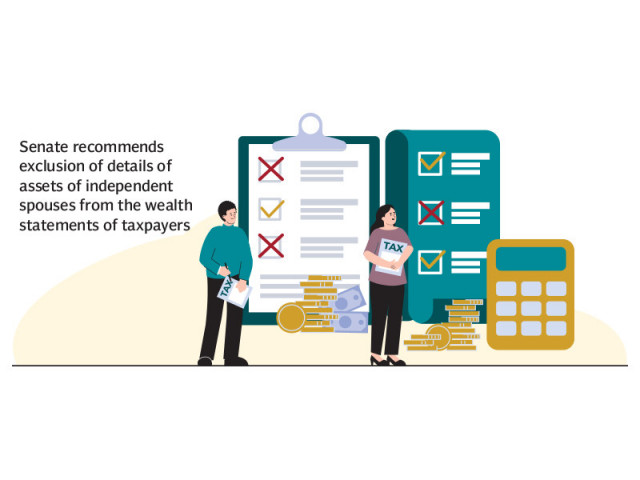Senate rejects tax hikes for workers
Proposes exclusion of independent spouse’s assets from wealth statements

The Senate of Pakistan has rejected the government’s budget proposal to increase the tax burden on salaried and non-salaried business individuals. It also proposed excluding the asset details of a financially independent spouse from the wealth statement of filers.
On Monday, the upper house of Parliament sent its recommendations to the National Assembly (NA) for incorporation in the Finance Bill 2024-25. Finance Minister Muhammad Aurangzeb will respond to these recommendations in his speech today (Tuesday).
A major recommendation from the Senate suggests that the asset details of a taxpayer’s spouse can only be included in the wealth statement if the spouse is dependent. If approved by the NA, this could free politicians and politically exposed persons from undue scrutiny during witch hunts.
Under the chairmanship of Senator Saleem Mandviwalla, the Senate Standing Committee on Finance finalised these recommendations during multiple rounds, which the Senate endorsed and forwarded to the NA.
Senator Mandviwalla told The Express Tribune that the finance minister has agreed to accept most of the Senate’s recommendations.
Under the Constitution, the Senate does not have binding veto power, and it is the NA that is empowered to accept or reject any budget proposal. However, the Senate sent a loud message to both the government and the International Monetary Fund (IMF) by rejecting the proposal to increase the tax burden on salaried and non-salaried business individuals.
The government proposed to increase the non-salaried class tax burden to 45% at over Rs466,666 monthly income, and for the salaried class, it proposed a 35% income tax rate at Rs341,000 monthly income. The Senate also rejected the increase in tax rates on monthly income starting at Rs51,000.
The Senate also opposed a flat 15% capital gains tax on property disposals from July 1 and opposed increasing withholding tax rates for filers on property sales and purchases. The government had proposed substantial increases in these rates.
The Committee also rejected extending the income tax exemption for the erstwhile FATA for another year.
Finance Minister Muhammad Aurangzeb proposed a highly ambitious budget, with a nearly Rs13 trillion tax target that is not achievable without introducing a mini-budget. During the post-budget press conference, Aurangzeb declined to comment on whether a mini-budget would be introduced.
The Senate proposed that the late filers’ rate of 6% to 8% should not apply to those who have timely filed their return of total income in any of the last three tax years.
In yet another step towards the informal economy, Aurangzeb introduced the category of late filers in the budget. Late filers have been offered to buy assets by paying lower-than-non-filers income tax rates.
The Senate rejected the 5% federal excise duty on commercial property transfers and the proposal to share taxpayers’ data with NADRA for analysis and broadening the tax base.
The Senate also rejected the proposal to charge 75% income tax on the SIM cards of non-filers and opposed imposing up to Rs200 million per default penalty on mobile phone companies for failing to block non-filers’ SIM cards. The companies argued that they cannot act as the police for the FBR.
The government proposed that the FBR have the authority to determine the minimum value of goods for advance tax collection under section 148. The Senate opposed this, stating it would give unlimited powers to tax authorities and open another door to corruption.
The Senate also opposed empowering FBR members by delegating them the powers of the Board-in-Council.
Sales tax
The Senate opposed increasing the sales tax on FBR integrated shops from 15% to 18% and rejected raising the sales tax on hybrid vehicles from 8.5% to 25%. It also rejected increasing the sales tax from 5% to 10% on imported computers and laptops.
The Senate voted against imposing a 10% sales tax on stationery items and an 18% sales tax on milk, infant milk, and local supplies of commodities, raw materials, components, parts, and machinery to registered exporters under the Export Facilitation Scheme.
The Senate also rejected the imposition of 18% GST on newsprint, books, colours, writing instruments, erasers, exercise books, and pencils.
However, the upper house backed the budget proposal to impose an 18% GST on cardiac surgery and other surgical instruments, diagnostic kits, oil cake, tractors, and machinery.
The Senate rejected a proposal allowing the Abandoned Properties Organisation to retain Rs14 billion of public funds and invest in government debt. Senator Anusha Rehman expressed strong reservations about this amendment, stating it contradicted existing law passed in 2019.
The Senate recommended to the NA that credit and debit card transactions should be mandatory for purchases above Rs35,000 to encourage economic documentation.
The Senate also proposed a uniform sales tax rate on parts related to the solar industry, whether imported or produced locally. It suggested that to increase the capacity of the FBR to broaden the tax net, the 5000 vacant posts in the FBR should be filled on priority, following proper merit-based appointment procedures.
The Senate recommended that corporate debit card transactions be exempted from the additional 5% tax to avoid double taxation and promote the use of ESFCAs on foreign exchange earned by IT companies.
It also suggested collecting tax from people owning property outside Pakistan at a rate of 1% of the rental value of the property instead of its actual value. Additionally, the existing annual limit of $30,000 on credit card usage should be increased to at least $50,000.



















COMMENTS
Comments are moderated and generally will be posted if they are on-topic and not abusive.
For more information, please see our Comments FAQ